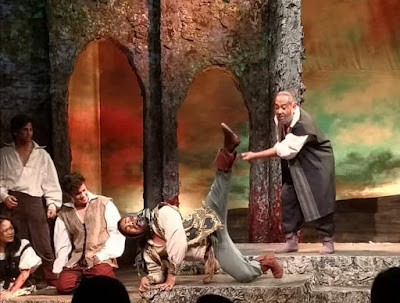"Antigone" is a Greek tragedy by Sophocles written more than 500 years before Christ. It is about an act of civil disobedience by a girl who dared to willfully defy a law set by the ruling authority. As the second offering of Tanghalang Ateneo's 41st season themed "Sulat-Babae", playwright Sabrina Basilio used this basic premise of the original play to set up a totally different scenario and ensuing events. In Basilio's adaptation, the girl and the president were held captive by a multi-sectoral Chorus and then made to face off with each other in a people's court.
Antigone buried the corpse of her deceased brother Polynices, However with this simple act, she broke a law promulgated by President Kreon that the dead body of a traitor against the government like him should just remain unburied on the fields of battle. In her favor, Antigone argued on the grounds of human decency and morality. They were made to reenact the circumstances around each of their crimes.
The persecuted Antigone
We also hear numerous ordinary citizens who testified for and against each of the accused. Those for Antigone were those who had suffered persecution at the hands of Creon and his policemen. Those against Antigone were those who had benefited from the policies of Creon. Throughout the play, these witnesses talked directly to the audience who was made to act like the jury. At the end of the play, everyone in the bleachers will be asked to decide on the case presented. Should Antigone remain incarcerated, or should she be set free?
If you have no idea what "Antigone" was about, it was not that easy to get into the play initially. What the Chorus members were doing did not sink in right away, but the play's style eventually became evident. One time they were asking people involved in the case to read off what looked like scripts. Then the next scene, any one of a number of ordinary folk (government employee, environmental advocate, prostitute, etc...) were relating their testimonies for or against Antigone. It can be confusing at first as the story proceeded in this manner, only to clear up a bit later.
The intimidating President Kreon
You note the shifts of the language spoken by the various characters, from the Filipino of the masses to the American-accented by Antigone, Creon and the other characters of higher class, and eventually realize that this story was also about social class. Should someone from the higher classes involve himself (or herself, in Antigone's case) in public discussions about social issues like human rights? Being played in a university known of its privileged studentry -- the intent, message and challenge of the writer was loud and clear. The audience will be asked to submit their judgement in a vote towards the end, and the aftermath of their decision will be presented to conclude the play. Basilio revealed that there were three alternate endings depending on the outcome of the audience vote.
The Audience is requested to decide.
During the show I watched, Eliezha Nicole Duque with her big glaring eyes played the indignant Antigone. Her voice was soft and uncertain at first, gaining in conviction and confidence as the play went on. (Julia Imai alternates as Antigone.) With his heft and beard, Robbie Fernandez was impressive as an imposing Kreon. It was hard to believe that he was only a freshman Engineering student. Gevin Luarca played Creon's son and Antigone's betrothed Haemon. I felt his major conflict of being torn between loyalty to father and love to fiancee was not played up enough. (Joey Madarang alternates as Haemon.)
Jam Binay played a subdued subservient Ismene, Antigone's sister. (Bea Gaitana alternates as Ismene.) Kyle "Woody" Tan, Luigi Antonio Santos and the scene-stealing Lars Michaelsen Salamante played the three guards who kept watch over Antigone. (Deivid Allan Encarnacion and Ram Catan alternate as guards). Pauline Matabang played the Chorus Leader, while Bienne Dator, Arianna Lopez, Carmen Dolina, Kim Donato, Jaennina Gangat, Angela Lanuza, Maika Daupan, Iago Babao Guballa, Rye Cosca and Andre Enriquez play the Chorus, here transformed into the prosecuting People of the Philippines.
The Cast at the Curtain Call
Director Tarra Jamora Oppen elected to stage the court proceedings in a sort of post-apocalyptic society still reeling from a harrowing people's revolution, as reflected by the production design by Tata Tuviera, enhanced by the lights designed by Earvin Estioko. Graphic designs by Carmen Dolina and Franny Tan were flashed on white cloth hanging on opposite walls of the room where audience can see them well.The sound design by Krina Cayabyab set an eerie atmosphere to the proceedings. Microphone issues affected the show I watched, so the cast needed to project their voices louder to be heard well, but not always clearly. The movement of the Chorus was designed by Jomelle Era, assisted by CJ Lubangco.
*****
"ANTIGONE VS. THE PEOPLE OF THE PHILIPPINES" runs from November 16 to 30, 2019 at the Old Comm Black Box Theater of the Ateneo de Manila University. Ticket prices at 350 Php for ADMU students, 320 Php for ADMU scholars and 400 Php for the general public. For ticket reservation inquiries, contact Ana Ruiz at 0917 813 3077.










